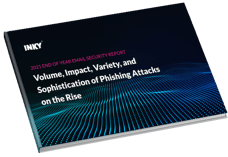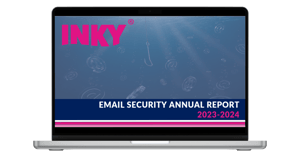A security breach at your organization can cause you a lot of trouble. You’ve undoubtedly seen some of the staggering costs of cybercrime to U.S. companies. In the last five years alone, cybercrime has cost the U.S. $18.7 billion.1 And it’s not just larger organizations that are at risk. Studies show that small businesses are targeted three times as often as larger companies and see 350% more social engineering attacks.2 Regardless of your company’s size, what some people consider to be a secure network isn’t always enough.
Overlapping layers of security are a necessity because where one layer is potentially bypassed another can block an attack. From firewalls to network intrusion prevention/detection systems (NIPS/NIDS) to security information and event management systems (SIEM) and secure web gateways (SWGs) companies need to be on the defensive. And while many companies believe they’re doing enough, there is one area where you can’t be careful enough - your employees’ email.
Every single employee at your organization who has an email account can be a target of phishing scams. And these scams employ a wide variety of increasingly sophisticated techniques to fool your employees into divulging credentials and sensitive data, loading malware and ransomware onto your system or even transferring funds into a fraudulent account.
According to the FBI, of the 847,376 internet crime complaints they received in 2021, phishing and related schemes were the most common.1 Why? Because they are so effective.
Today’s phishing schemes use a variety of techniques, including spoof emails, brand forgery, CEO impersonation and other advanced methods of fraud that are difficult to detect. Even employees of Facebook and Google have fallen for these phishing attacks, with the two companies losing a combined $100 million during one long-running scheme.3
COVID-19 Permanently Changed the Way We Work
Working from home has become the norm for many organizations. Without the ability to gather in person for a meeting or stop by a co-worker’s desk to ask a question, we’re relying on email more heavily than ever. This increase in email usage might be necessary — but it’s increasing your vulnerability too.
Remote work often comes with its own set of distractions and employees can let their guard down. Considering each employee receives an average of 14 malicious emails per year, and 85% of all data breaches involve human error, employers have a great deal to worry about.4
To make matters worse, remote working has called for procedural changes when it comes to working with vendors, banks, and clients – opening up additional areas of vulnerability. Clearly, it’s more important than ever that your online security strategy has the ability to stop the phishing threats your employees would miss on their own. Without good email security, you have little security at all.
How You Can Improve Your Email Security
Firewalls are an essential first line of defense for securing your network perimeter and doing some initial work to separate trusted networks from the untrusted. DNS filtering is another common layer in a company’s security stack that blocks access to certain websites, webpages, and IP addresses. And, for those who have the unfortunate experience of having these systems fail, endpoint security solutions detect and often remove malware that has been downloaded.
Of course, firewalls, DNS filtering and endpoint security can’t protect you from email phishing schemes. And, Office 365 defenses legacy Secure Email Gateways are simply no match for the sophisticated cyber criminals crafting today’s phishing emails.
To truly have a handle on phishing threats, you need a third party’s assistance. INKY offers a relentlessly effective level of email security, capable of detecting and stopping phishing threats and similar cybercrimes before any employee falls for them. Using computer vision, artificial intelligence and machine learning, INKY provides a level of ingenuity that is unlike other email security platforms. INKY sees things the way humans do, recognizing logos, brand colors, email signatures and more — but it also sees the millions of things humans can’t, spotting imposters by as little as a pixel.
INKY starts with artificial intelligence and then goes a lot further. The system recognizes brands just like you and your employees do but can spot imposters by a pixel. The more that INKY sees, the more the system learns; and the more the system learns, the more that INKY sees. This allows INKY to adapt in real-time to the evolving threat landscape and keep you protected 24/7/365.
But it’s not just about the way INKY learns. The system is set up to help your employees learn too. Typically, phishing-awareness training lacks real-world context, relying on hypotheticals. INKY, however, uses simple-to-understand banner alerts on every email that provide gentle — but persistent — cues whenever it detects something is amiss. This provides clear context and continually educates your employees, training them on what to look out for and easing the burden on your IT department.
If email is an essential part of your business operations, you must take every measure to secure your communications and avoid becoming a victim of cybercrime.
See how INKY can help you do just that. Sign-up for your free demo today.
----------------------
INKY is an award-winning, cloud-based email security solution developed to proactively eliminate phishing emails and malware while simultaneously providing real-time assistance to employees handling suspicious emails so they can make safer decisions. INKY’s patented technology incorporates sophisticated computer vision, machine learning models, social profiling, and stylometry algorithms to effectively sanitize emails, rewrite malicious links, detect and block security threats, mitigate sender impersonation, and more. Cost-effective and powerful, the INKY platform was developed for mobile-first IT organizations and works seamlessly on any device, operating system, and mail client. Learn more about INKY™ or request an online demonstration today.
1Source: https://www.ic3.gov/Media/PDF/AnnualReport/2021_IC3Report.pdf
2Source: https://www.forbes.com/sites/edwardsegal/2022/03/30/cyber-criminals/?sh=4adc7da52ae5
3Source: https://www.fbi.gov/news/stories/2019-internet-crime-report-released-021120
4Source: https://www.soscanhelp.com/blog/top-phishing-scams-of-2021



